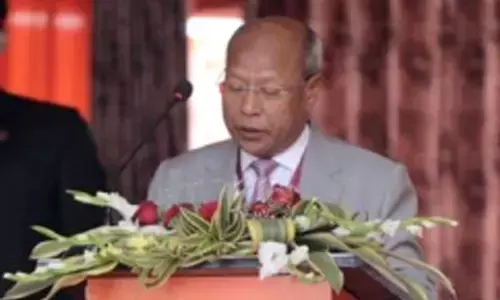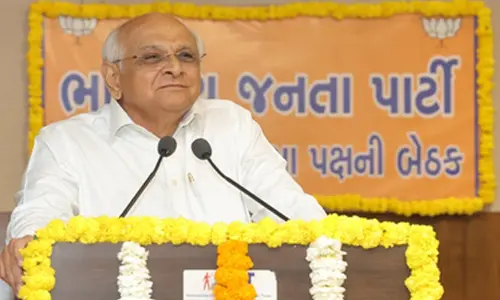Rudrama Devi, the first woman ruler of Andhra

Rudrama Devi, the first woman ruler of Andhra. Rani Rudrama Devi (1259−1289AD) was one of the most prominent rulers of the Kakatiya dynasty.
.jpg) Rani Rudrama Devi (1259−1289AD) was one of the most prominent rulers of the Kakatiya dynasty. She was born as Rudramba to King Ganapati Deva, who ruled Warangal, the capital of Kakatiya kingdom that had sway over the entire Andhra Pradesh during the 13th century.
Rani Rudrama Devi (1259−1289AD) was one of the most prominent rulers of the Kakatiya dynasty. She was born as Rudramba to King Ganapati Deva, who ruled Warangal, the capital of Kakatiya kingdom that had sway over the entire Andhra Pradesh during the 13th century.
Rudrama was formally designated as a son through the ancient Putrika ceremony and given the male name Rudradeva. Rudrama Devi was married to Veerabhadra, eastern Chalukyan prince of Nidadavolu.
Succession
On the advice of Sivadevayya (prime minister), Ganapati Deva nominated Rudrama Devi as his successor. When she was only 14 years old, Rani Rudrama Devi succeeded her father. In the first two or three years of her conjoint rule with her father, the kingdom was thrown into confusion and disorder due to Jatavarma Sundara Pandya-I's invasion and the disastrous defeat of the Kakatiyas along with their allies at the battle of Muttukur. Though Ganapati Deva turned the tide of the invasion, he lost his territory and his hold over his feudatories. He retired from active politics and complete power was vested with Rudrama Devi. Various inscriptions suggested that her independent rule started from 1261 AD. Rudramma Devi ruled till 1289.
Reign
Her ascendancy was resented by some nobles and her cousins only because she was a woman. They later raised a banner of revolt. Rudrama Devi wore a male attire and sat on the throne and with an iron hand ruled the kingdom keeping the enemies at bay. Pandyas and Cholas from the south Indian peninsula were a great threat and she kept them at bay with great vigour. After her accession she had to fight Harihara Deva and Murari Deva, who revolted against her. She had some efficient nobles like Jaganni Deva and Gona Ganna Reddy who helped her in suppressing revolts.
The Kalinga King Narasimha-I, who suffered a defeat previously at the hands of Ganapati Deva, took advantage of the distracted condition in the Kakatiya dominions and marched with his forces into the Godavari delta to recover his lost possessions. In the later part of the reign of Rudrama Devi, the above provinces came back under her control. Her commanders Poti Nayaka and Proli Nayaka fought against Kalinga Vira Bhanudeva-I, son and successor of Narasimha-I, and his accomplices Arjuna Deva, the Matsya chief of Oddadi and others and inflicted a crushing defeat on them. The Kakatiya power was thus re-established in coastal Andhra.
But the biggest threat came from the West in the form of Seuna Yadavas of Devagiri. Rudrama Devi defeated Mahadeva Raja, the Seuna Yadava ruler of Devagiri (Daulatabad in Aurangabad District at present in Maharashtra) who invaded Warangal (earlier known as Orugallu or Ekasilanagaramu) Fort, the capital of the Kakatiya empire, and chased him away. She crossed Godavari chasing the Yadava ruler right into his territories and forced him to make peace. The Devagiri king had to pay ransom to the queen and made peace. Although such treasures gained after victory belonged to the royal house, she distributed the wealth among her troops.
In the south, the Nellore Kingdom came under the power of the Pandyas and was placed under their vassals. The Kayastha chief Janniga Deva re-occupied the territories of the Nelluru kingdom and freed them thus from the Pandyan sway. He and his brother Tripurari Deva I (1270-72 A.D.) continued to rule the Nelluru kingdom as the vassals of Rudrama Devi. However, with the succession of their younger brother Amba Deva to the throne in 1272 AD, the situation underwent a change.
Rudrama Devi could not tolerate disloyal Amba Deva. By that time Prataprudra, her grandson, became old enough to share the responsibilities of the administration. He was an extraordinary war planner. He planned a three-prong attack on Amba Deva. The intention was to weaken all his support systems so that he would not have had enough strength. Of the three, the first was led by the Queen Rudrama Devi and her general Mallikarjuna. However, as the recently discovered Chandupatla (Nalgonda district) inscription dated 1283 AD indicated, Amba Deva seemed to have killed Rudrama along with Mallikarjuna Nayaka in a battle that year. However, the army of Rudrama Devi was victorious. Later, Prataparudra II, successor of Rudrama, succeeded in completely suppressing the Kayastha revolt.
Her rule and patronage
Among Rani Rudramma Devi's accomplishments during her reign was the completion of Warangal Fort, begun by her father, in the Kakatiya capital of Warangal (one stone hill). Parts of the fort are still standing, including examples of distinctive Kakatiya sculpture. She worshipped Goddesses Bhadrakali, Ekaveera and Padmakshi. She captured important forts like Mulikinadu, Renadu, Eruva, Mutthapi Nadu and Satti.
Legacy
Rudrama Devi was one of the most outstanding queens in Indian history from the Kakatiya dynasty and people still cherish her memories. Her gender did not come on her way in discharging the duties of her exalted office. She took an active part in governing the country and strove hard to promote the best interests of the state. In spite of the wars which frequently disturbed the country, her people remained contented and happy under her rule.
Marco Polo, the Venetian traveller who paid a visit to the kingdom probably a little later, spoke highly of her administrative qualities, benign rule and greatness.
Next Story








